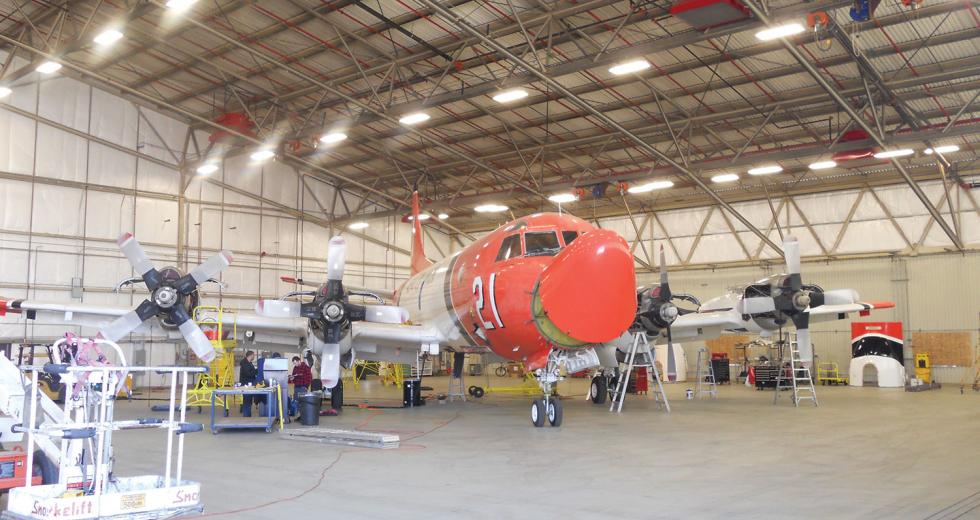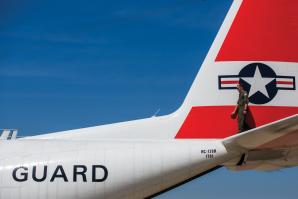Last year the nation watched as images of weary firefighters battling a massive inferno in the Angeles National Forest blazed across their TV screens. After starting on Aug. 26, 2009, the Station Fire went on to burn 160,577 acres, injure 22 people and kill two firefighters before it was fully contained nearly two months later.
Then there was the smaller, but highly publicized Fourmile Canyon Fire near Boulder, Colo., in September.
Fighting those treacherous fires — and many more throughout the nation — were pilots and planes from Aero Union Corp., headquartered at McClellan Park. Touted as the largest, most respected air tanker company in the United States, Aero Union is one of McClellan’s newest tenants, having moved its headquarters from Chico Municipal Airport in October.
Aero Union operates eight P-3 Orions with the U.S. Forest Service on a multiyear contract and is known worldwide for its computer-controlled firefighting retardant system and its aerial fuel tank systems.
According to Michael Grimm, chief pilot and director of flight operations at Aero Union, this aircraft was introduced into the U.S. Forest Service firefighting fleet by Aero Union in 1990, starting with two P-3s and expanding over the years.
Aero Union is the only commercial operator of this aircraft in the world, Grimm says. Over the past 13 years, these planes have averaged 1,672 flight hours on forest fires, flying 2,119 flights and dropping 5.46 million gallons of retardant annually. The planes have been used for other disaster-relief services too, such as the recent Gulf of Mexico oil spill cleanup.
The firefighting season for Aero Union runs from spring through fall. The aircraft can be dispatched anywhere in the United States, except Hawaii, at any time during the contract period. Typically, though, planes start in March in the Southeast around Florida or Georgia then spend the spring in the Southwest. In the summer they head into the Western mountain region of Colorado, Utah, Idaho and Montana and then the Northwest. The season caps off in Southern California by December.
“So while the planes are here during the winter, in the summer they’re all over the place,” CEO Britt Gourley says. “Because our planes are pretty doggone quick and have great range, we cover a lot of ground.”
Heading into the offseason, the company still is hopping with activity. “I have some of the pilots writing reports and helping us with pilot-training programs, writing up the manuals or consulting with our customers on pilot safety,” Gourley says.
Meanwhile, the maintenance crews will be busy getting the planes ready for next season and going through Federal Aviation Administration-mandated annual maintenance training. In January the pilots, many of whom live in the Capital Region, also will go into their annual training. “They go to the simulator and get qualified and certified every year for the next season,” Gourley says.
After starting in Redding in 1960 as Western Air Industries, Aero Union moved to Chico in 1964. Over the years, it’s operated and maintained a wide variety of aircraft, mostly surplus military planes obtained from the Aerospace Maintenance and Regeneration Center at Davis-Monthan Air Force Base in Tucson, Ariz. These aircraft have been repaired by Aero Union’s maintenance technicians and then flown by its pilots to California for conversion to firefighting aircraft.
Aero Union develops and manufactures aerial fuel tank systems used by militaries around the world for both aerial refueling and bulk fuel transport on the C-130 aircraft and other platforms.
With 22 pilots, 38 in maintenance and quality assurance, 10 in manufacturing and the remaining 77 employees in business administration and various support services, Aero Union’s main reason for moving from Chico is simply its outgrowth of its small-town airport space, Gourley says.
“Chico’s a great town to run a small business, but it’s very difficult to operate a business like this in a small town,” Gourley says. “It’s hard to get access to machine shops, suppliers, engineering — all the stuff that makes aerospace grow. McClellan offered all of that to us. So we were able to reduce costs fairly dramatically, be more efficient and offer savings to our customers.”
Gourley recently had a phone conversation with a client impressed with the attractive pricing. “This guy called wanting to buy one tank. Now he wants to buy three. … Our move to McClellan is starting to really pay off,” Gourley says.
But access to the amenities of a larger city is just part of the plusses.
“The aerospace community here has greeted us with open arms and have just been tremendous resources for us. You can pick up the phone and say, ‘Hey, I need a painter. You got any ideas?’ and they say, ‘Sure, here’s three names.’ Same thing if you’re looking for additional technical people. It’s just really nice to have a community out here that can do you a favor or give you a recommendation.”
Where he usually starts first is with the staff at McClellan Jet Services. “Scott Owens (senior vice president) has an awesome Rolodex,” Gourley says. “The whole crew over there can’t do enough for us.”
Aero Union used to have a McClellan division focusing on propeller services, engines, airborne cargo services and avionics. It also ran a full maintenance, repair and overhaul service for outside customers. “Think of it as a Monster Garage for airplanes,” Gourley says. But Gourley has scaled the company back to make it more profitable, focusing on its core mission of aerial firefighting.
His predecessor as CEO, Terry Unsworth (who became ill and passed away in 2009), leased space at McClellan for its maintenance, repair and overhaul services. When Gourley took over, he shut down those services.
“So we moved out of McClellan — and then two years later moved back to McClellan,” Gourley says. Only this time, its headquarters and entire operations are moving.
All the airplanes and executive offices are moved. After wrapping up a few commitments, Aero Union will move everything to McClellan by June.
Looking ahead, Gourley is optimistic both for Aero Union and what it will bring to the Capital Region.
“We’re poised for growth,” he says. “We’re looking to expand our fleet. I can’t divulge numbers yet, but we’re actively pursuing a bunch of aircraft by 2012. With that comes maintenance and all kinds of support services” that will bring more jobs and business to Sacramento, Gourley says.
“It’s already been a boon to local engineering firms, machine shops, paint shops and all that stuff we used to do in-house very expensively,” he says.
And his company has reciprocated, he says. “We’re getting great deals from very highly qualified suppliers here in Sacramento. So it’s a win-win.”




